- UK (EN)
- Africa (EN)
- Australia (EN)
- Belgium (EN)
- Brasil (PT)
- Canada (EN)
- Canada (FR)
- China (CN)
- France (FR)
- Germany (DE)
- Germany (EN)
- Global (EN)
- Hong Kong (EN)
- India (EN)
- Indonesia (EN)
- Ireland (EN)
- Italy (IT)
- Italy (EN)
- Japan (JP)
- Korea (KR)
- Latin America (ES)
- Malaysia (EN)
- Middle East (EN)
- Netherlands (EN)
- Spain (ES)
- UK (EN)
- Africa (EN)
- Australia (EN)
- Belgium (EN)
- Brasil (PT)
- Canada (EN)
- Canada (FR)
- China (CN)
- France (FR)
- Germany (DE)
- Germany (EN)
- Global (EN)
- Hong Kong (EN)
- India (EN)
- Indonesia (EN)
- Ireland (EN)
- Italy (IT)
- Italy (EN)
- Japan (JP)
- Korea (KR)
- Latin America (ES)
- Malaysia (EN)
- Middle East (EN)
- Netherlands (EN)
- Spain (ES)
A collision of trust, innovation, and politics
The 2024 Edelman Trust Barometer reveals a new paradox at the heart of society. Rapid innovation offers the promise of a new era of prosperity, but instead risks exacerbating trust issues, leading to further societal instability and political polarisation.
In a year where half the global population can vote in new leaders, the acceptance of innovation is essential to the success of our society. While people agree that scientists are essential to the acceptance of innovation, many are concerned that politics has too much influence on science. This perception is contributing to the decline of trust in the institutions responsible for steering us through change and towards a more prosperous future.
READ MORE
⇓
Explore the findings
Business is trusted to make sure innovations are safe, understood & accessible
Most institutions are not trusted to introduce innovations to society. While business leads, it’s still just below 60 percent (Trust is 60 percent or above). Media is actively distrusted. And there is less trust across institutions among those with low income.

Acceptance of innovation is at stake
Respondents by nearly a two-to-one margin believe innovation is poorly managed (insufficient government regulation, lack of trust in traditional leaders, suspicion of science’s independence from politics and money). Respondents need to know that the inventions have been evaluated by scientists and ethicists, are effectively regulated, and feel in control over the impact on their lives.

4 Ways to Restore Trust in the Promise of Innovation
1. Implementation is as important as invention
Mismanaged innovations are as likely to ignite backlash as advance society. With breakthroughs like AI, vaccines, and green energy on the line, explaining the science and managing impacts is essential.
2. Business must partner for change
Business is most trusted to introduce innovation into society, with an emphasis on partnering with government. CEOs need to safeguard jobs and take a stand on emerging ethical concerns.
3. Science must integrate with society
Scientists are still trusted—but increasingly subject to public scrutiny. To build trust in expert recommendations, explain the research, engage in dialogue, and harness peer voices as advocates.
4. Give me control over my future
When people feel in control over how innovations affect their lives, they are more likely to embrace them, not resist them. Listen for concerns, be open to questions.
Explore the findings
The Trust 10
01
The virtuous circle of trust
⟲
01
Trust is based first on economic prosperity, evidenced by the fact that developing countries have higher trust levels than developed countries. Innovation can drive growth for all levels of society, resulting in higher trust in institutions.
02
Society is changing too quickly
⟲
02
A majority of respondents who believe that innovation is poorly managed think that society is changing too quickly and not in ways that benefit people like me.
03
Peers on par with scientists
⟲
03
Seventy-four percent say they trust scientists and peers, equally, for the truth about innovations; however, peers are more trusted than scientists among those who think innovation is poorly managed.
Insights
We will never realise the promises of the future without trusted information

Ruth Warder: CEO Edelman UK & Ireland & EMEA Brand Chair.
The relationship between the British people and their government has hit a significant low point. While this may not come as a surprise to many, this is an alarming trend as an election looms and we enter one of the most turbulent years in recent memory.
Closing the Trust gap in a 2024 bumper election year

Ed Williams: President of International at Edelman.
The storied political consultant, Paul Begala, once said that politics is show business for ugly people. Not this year. Because in 2024 politics is set to be the new rock and roll, with an unprecedented 4 billion people across the globe expected to vote in more than 60 elections.
Innovation: Destroyer or saviour of worlds?

Sat Dayal and Nick Hope on the 2024 Edelman Trust Barometer and the Perils of Innovation.
Parallels are often drawn between the existential threat posed by nuclear weapons, and the arrival of Artificial Intelligence (AI). On the release of Oppenheimer, Director, Christopher Nolan himself noted how recent calls for restraint on the AI development mirrored those from the father of the atomic bomb.
What does this mean for your business?
Methodology
The 2024 Edelman Trust Barometer is the firm’s 24th annual survey. The research was produced by the Edelman Trust Institute and consisted of 30-minute online interviews conducted between November 3 and November 22, 2023. Learn more >
28
Countries
32,000
Respondents
±1,150
Respondents / Country





